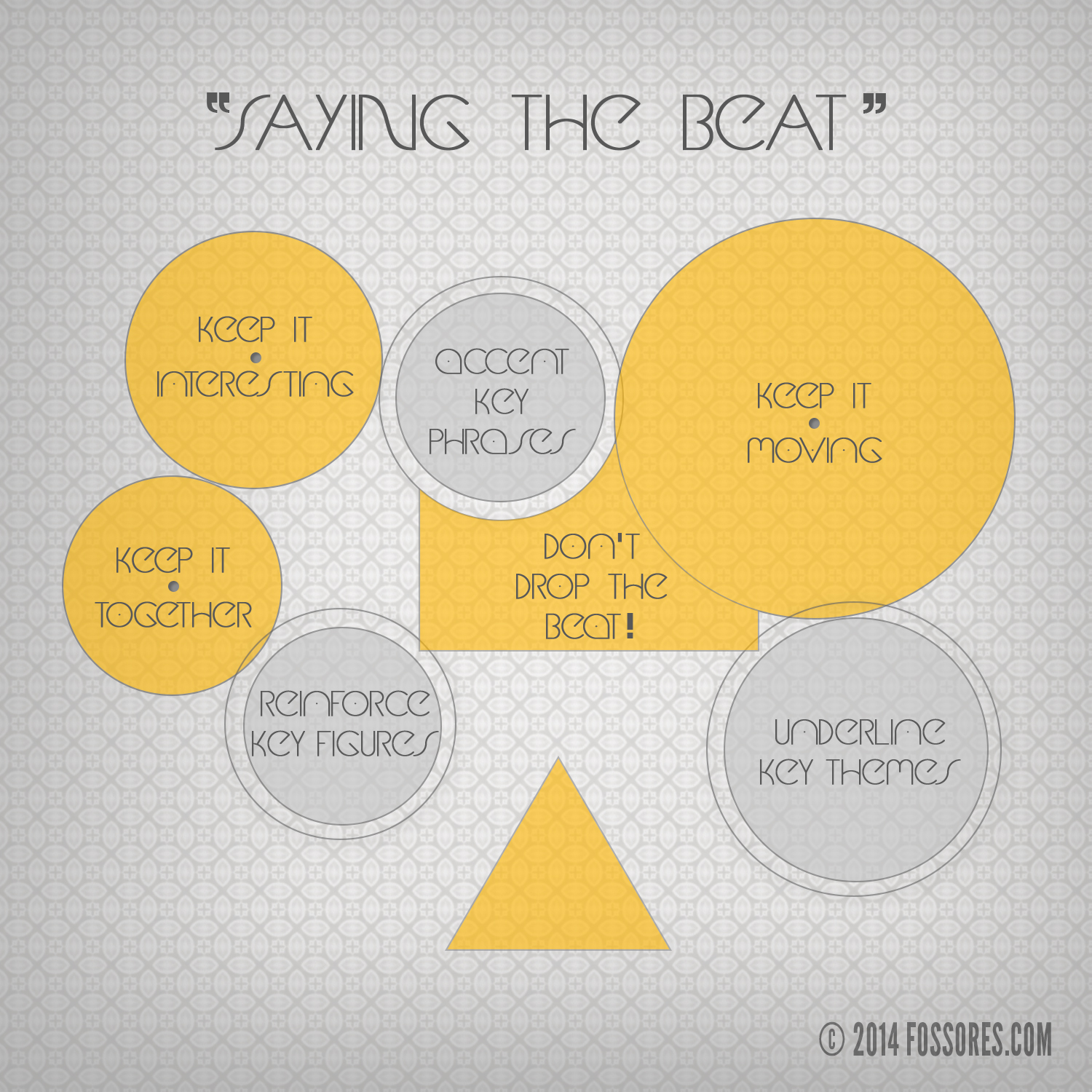The most prevalent means of coaching new fiction writers on dialogue is to talk about beats. When I first heard the term I was confused. I imagined “beats” referred to moments, as in screenwriting or stagecraft when an actor would deliver a portion of a line, take a break (signified by “beat” in the notes), then conclude with a big whammy. (Krusty the Klown gave me a great example of this last night when he opened his monologue on The Simpsons dressed as Dracula and said “I’m going to suck…your blood.”)
In fiction, however, “beats” refer to the pace and rhythm of the dialogue. When two characters are engaged in witty banter, then change to a heartfelt moment of vulnerable confession—that change is when the beat switches. The old beat is the banter. The new beat is the confession.
The best way to understand this terminology is by thinking of drum beats. A change in a drummer’s pattern signifies a change in the song—from verse to chorus, from bridge to coda, etc.
When writing dialogue, you’ve got to think about how long each beat can last at its maximum effect. You’re always asking, “When does this beat get boring?” and then making sure you change into a new beat well before that happens.
Thinking of drum beats—and only drum beats (no other instruments)—is a helpful tool in gauging the interest of your audience. “Saying beats” gets everyone on the same page, in the same groove, and bopping their heads at the same time. It’s a shared experience. Saying beats also keeps things moving, ensuring you’re tuned into the audience’s comprehension and you are leading them forward to your next conclusion—The smash! The splash! The crash! Saying beats also keeps your content interesting—deliver a joke, then change up the beat and tell a story, then fill in with some maxims before dropping something heavy and bringing the audience to a moment of reflection.
I’ve been a drummer for 25 years, so I confess that beats make sense to me in a way they might not to everyone. But everyone knows what drums are, just as everyone knows that listening to a drum solo is only exciting for about a minute. Tops. Why? Because it all starts to sound the same—regardless of the drummer’s skill and regardless of the lights and lasers playing around the stage. The only way for a drummer to keep the audience interested is by changing the beat.
The same is true for you and me.
Whether you’re writing dialogue, leading teams, or delivering a sermon, you’ve got to change up the beat to make it work.
Here are three tips for when you next say the beat.
- Add shots and figures. Beginner drummers think their instrument is all about cool patterns, but the pros know that your beats have to be spiced up with shots and figures—everything you play needs to both reinforce the baseline and set up the rest of the band for the big moments. The same is true for speaking or leading. Within every beat, you’ve got to be mindful of the overall message you want to underline, just as you’ve got to carefully construct your words for maximum effect. Theme and diction are essential tools.
- Watch for the changes. When the Red Hot Chili Peppers record new music, they follow one simple rule: never play the same section the same way. Sure, the chord structure and lyrical pattern in each verse is the same, but that’s why verse two needs extra attention. Change the rhythm line. Leave out the harmony. Add percussion. When you’re speaking, you’ve got to watch for signs of audience malaise. Look at their eyes. Observe their posture. Use these cues to inform when and how often you change your beat, and use your collective experience to anticipate those changes and make them before the audience tires.
- Never drop the beat. Have you ever been to a concert when the drummer lost time completely? When their fancy fill added an extra beat to the bar and threw off the whole band? It’s horrible! As a speaker, you will undoubtedly make mistakes. You’ll flub your words, spit, lose your place, etc. But never. Ever. Never ever. Lose the beat. When you falter, recover and keep the pulse going. If you keep the beat, the audience will forget your mistakes. If you lose the beat, the whole show will be ruined.
These simple skills will help you whether you’re writing a story, delivering a speech, or—God forbid—called upon to perform an impromptu drum solo.
fossores
Related posts
Categories
Category Cloud
Tag Cloud
Recent Posts
- Victors and Victims November 6, 2018
- 3 Hacks for Happiness October 29, 2018
- Hope Against Death September 20, 2018
- The Shape Of The Cross September 19, 2018


